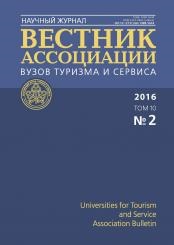Moscow, Russian Federation
The article substantiates the relevance of a cluster model integrating the resources of those participating in the system of personnel training for the Moscow region tourism and service industry with the view to alleviating the personnel shortage and the inadequate professional training of the employees in the target sphere of regional activity. The principle of continuous professional development based on the strategic complex approach to the demand-for-personnel forecasting is used as the conceptual foundation for the cluster formation. The authors propose a solution to the personnel issues concerning multisector spheres of activity: 1) at the regional level; 2) on the intersectoral and interdepartmental basis. The authors describe the efficiency factors of a cluster-model-based organization of professional training systems providing personnel training fordifferent spheres of activity. Among these factors are: 1) regional and local authority’s engagement in solving the staffing problems of the major sector; 2) a recognition by the administrative bodies, educational establishments, business and society in general of the necessity to consider not only the narrow utility task of vacancy-filling, but also, more importantly, the task of equipping the learners with valuable personality tools potentially promoting effective socialization, professionalization, and continuous development through common cultural, methodical and professional competence formation; 3) the readiness level of participants in the system of professional training to take a systematic, purposeful and progressive perspective on developing the on-mid-and-long-term-demand training programmes: from professional induction at the initial stages of learning to advanced training at graduate and postgraduate levels.
Education cluster, personnel training in tourism and service, forecast of demand for personnel
Введение
Одной из принципиально важных задач модернизации российской науки и образования является задача развития системы непрерывного профессионального образования на основе стратегического комплексного подхода к прогнозированию необходимых потребностей в кадрах в различных сферах деятельности. При формировании структуры и содержания профессионального образования соответствующих направлений подготовки учитываются средне- и долгосрочные прогнозы потребностей в кадрах, а также специфические требования к компетенциям, которыми должны владеть работники разных квалификаций в разных должностных позициях [2].
Комплексный характер проблемы обеспечения кадрами многопрофильных сфер деятельности, таких, например, как туризм и сервис, требует ее решения на межотраслевой и межведомственной основе [5; 6]. Различия в социально-экономической, демографической, культурной ситуациях в различных регионах Российской Федерации также требуют учета при определении образовательной политики
[3] и разработке стратегии непрерывной подготовки кадров. Решение конкретных задач обеспечения кадрами разных сфер экономической деятельности в регионах РФ зависит от трех существенных факторов:
- от понимания проблемы и активного участия в ее разрешении региональных и местных властей;
- от осознания административными органами, образовательными учреждениями, бизнесом и социумом в целом необходимости решения не столько узкоутилитарной задачи заполнения вакантных мест, сколько задачи вооружения обучаемых полезным личностным инструментарием, способствующим успешной социализации, профессионализации, постоянному развитию на основе формирования общекультурных, методических и профессиональных компетенций [4];
- от готовности участников системы профессионального образования комплексно, целенаправленно, продуманно, поэтапно развивать востребованные в средне- и долгосрочной перспективе направления подготовки: от первого знакомства с профессией до повышения квалификации на различных, включая самые высокие, образовательных уровнях.
1. Bok D., 2004. Universities in the Marketplace: The Commercialization of Higher Education. Princeton: Princeton University Press, pp: 256.
2. Brown J., 2011. Securing a sustainable future for higher education. Data Views 26.01.2014 www.independent.gov.uk/browne-report
3. Chatterton P. and J. Goddard, 2000. The Response of Higher Education Institutions to Regional Needs. European Journal of Education, 35 (4): 475-496.
4. Chen K. and M. Kenney, 2007. Universities/Research Institutes and Regional Innovation Systems: The Cases of Beijing and Shenzhen. World Development, 35 (6): 1056-1074.
5. Harkison T., Poulston J. and J.-H. G. Kim, 2011. Hospitality graduates and managers: the big devide. International Journal of Contemporary Hospitality Management, 23 (3): 377-392.
6. Sakharchuk E. S., Khanbabaeva Z. M., Daitov V. V. Analysis of Practice Centered Aspects of Educational Programs in the Sphere of Tourism and Hospitality. World Applied Science Journal 27 (Education, Law, Economics, Language and Communication): 305-308, 2013.
7. Ofitsial’nyi sait Ministerstva obrazovaniia Moskovskoi oblasti [Ministry of education of the Moscow Region official website]. URL: mo.mosreg.ru.





